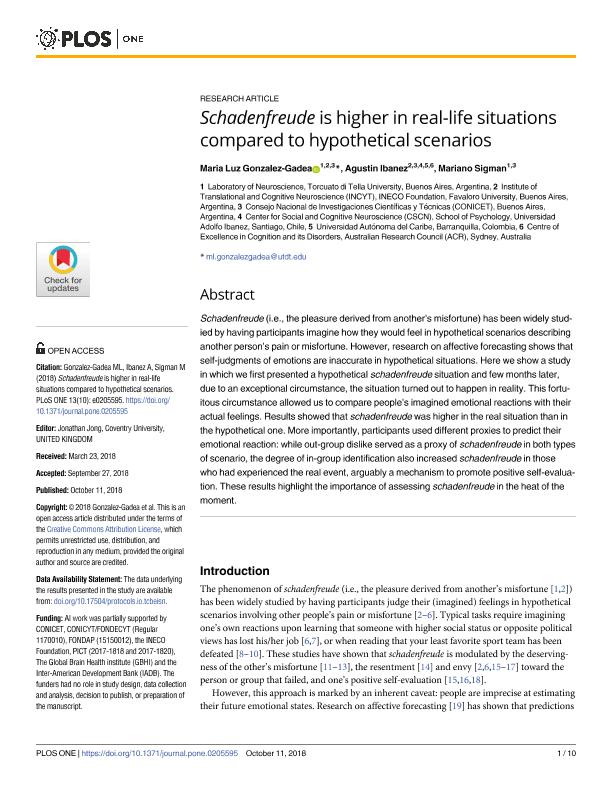Mostrar el registro sencillo del ítem
dc.contributor.author
González Gadea, María Luz

dc.contributor.author
Ibañez, Agustin Mariano

dc.contributor.author
Sigman, Mariano

dc.date.available
2020-02-20T19:43:02Z
dc.date.issued
2018-10
dc.identifier.citation
González Gadea, María Luz; Ibañez, Agustin Mariano; Sigman, Mariano; Schadenfreude is higher in real-life situations compared to hypothetical scenarios; Public Library of Science; Plos One; 13; 10; 10-2018; 1-10
dc.identifier.issn
1932-6203
dc.identifier.uri
http://hdl.handle.net/11336/98169
dc.description.abstract
Schadenfreude (i.e., the pleasure derived from another's misfortune) has been widely studied by having participants imagine how they would feel in hypothetical scenarios describing another person's pain or misfortune. However, research on affective forecasting shows that self-judgments of emotions are inaccurate in hypothetical situations. Here we show a study in which we first presented a hypothetical schadenfreude situation and few months later, due to an exceptional circumstance, the situation turned out to happen in reality. This fortuitous circumstance allowed us to compare people's imagined emotional reactions with their actual feelings. Results showed that schadenfreude was higher in the real situation than in the hypothetical one. More importantly, participants used different proxies to predict their emotional reaction: while out-group dislike served as a proxy of schadenfreude in both types of scenario, the degree of in-group identification also increased schadenfreude in those who had experienced the real event, arguably a mechanism to promote positive self-evaluation. These results highlight the importance of assessing schadenfreude in the heat of the moment.
dc.format
application/pdf
dc.language.iso
eng
dc.publisher
Public Library of Science

dc.rights
info:eu-repo/semantics/openAccess
dc.rights.uri
https://creativecommons.org/licenses/by-nc-sa/2.5/ar/
dc.subject
Schadenfreude
dc.subject
real-life situations
dc.subject
hypothetical scenarios
dc.subject.classification
Otras Ciencias Naturales y Exactas

dc.subject.classification
Otras Ciencias Naturales y Exactas

dc.subject.classification
CIENCIAS NATURALES Y EXACTAS

dc.title
Schadenfreude is higher in real-life situations compared to hypothetical scenarios
dc.type
info:eu-repo/semantics/article
dc.type
info:ar-repo/semantics/artículo
dc.type
info:eu-repo/semantics/publishedVersion
dc.date.updated
2020-02-18T16:12:27Z
dc.journal.volume
13
dc.journal.number
10
dc.journal.pagination
1-10
dc.journal.pais
Estados Unidos

dc.journal.ciudad
San Francisco
dc.description.fil
Fil: González Gadea, María Luz. Universidad Favaloro; Argentina. Universidad Torcuato Di Tella; Argentina. Instituto de Neurología Cognitiva; Argentina. Consejo Nacional de Investigaciones Científicas y Técnicas; Argentina
dc.description.fil
Fil: Ibañez, Agustin Mariano. Universidad Adolfo Ibañez; Chile. Universidad Autónoma Del Caribe; Colombia. Instituto de Neurología Cognitiva; Argentina. Consejo Nacional de Investigaciones Científicas y Técnicas; Argentina
dc.description.fil
Fil: Sigman, Mariano. Universidad Torcuato Di Tella; Argentina. Consejo Nacional de Investigaciones Científicas y Técnicas; Argentina
dc.journal.title
Plos One

dc.relation.alternativeid
info:eu-repo/semantics/altIdentifier/doi/http://dx.doi.org/10.1371/journal.pone.0205595
dc.relation.alternativeid
info:eu-repo/semantics/altIdentifier/url/https://journals.plos.org/plosone/article?id=10.1371/journal.pone.0205595
Archivos asociados
